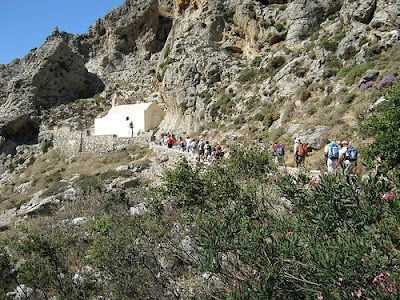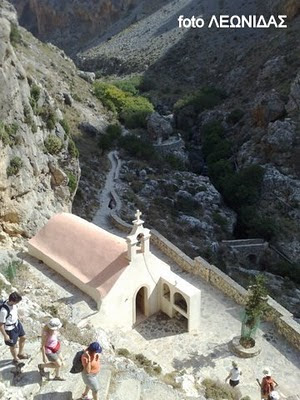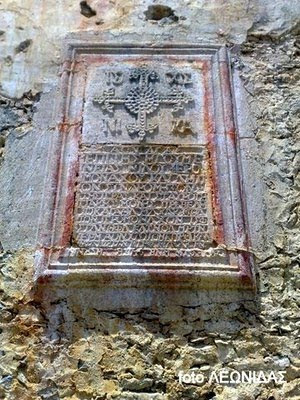Verse
You were shown to be a citizen of the wilderness
and the pride of the Venerable, O God-bearing Nicholas.
You were shown to be a citizen of the wilderness
and the pride of the Venerable, O God-bearing Nicholas.
There are many gorges in the southern shores of the Cretan mountains. The Gorge of Kourtaliotis is one of the most attractive around the area of Rethymno. It starts at the slopes of the mountains Kouroupa (984 m) and Ksiros (904 m), a little after the village Koksare, it follows the river Kourtaliotis and ends up at the beach of Limni Preveli. The name of the gorge has its origin in the Cretan word kourtala meaning “round of applause”. This refers to the sounds that are created when the sometimes very strong wind tears through the gorge.
At the outlet of the gorge stands the Chapel of St. Nicholas the Ascetic. Not too far above there are five springs 40 meters high that irrigates the entire area year around. According to local tradition, these springs are the result of a miracle of St. Nicholas, when he spread his five fingers on the rock, and immediately five springs emerged pouring water under the dry mountain and barren slope of the gorge. For this reason the people call this site "the blessing of the Lord".
We know almost nothing of the life of St. Nicholas save for what has been handed from local tradition. We are told he lived in the 17th century and died around 1670. He was a Rethymnian. Two villages claim him as their own - Phratta and Asomatos. When he was a young boy he possessed a charitable nature and would give his father's grapes and oil to the poor. Because of this, the grapes would multiply every harvest and the oil vessels would always remain full. Seeing the boy's charitable nature, his father gave his blessing to allow him to fully devote his life to Christ. It was at that time he went to live an ascetic life as a youth.

Local tradition says that for a period of his life he lived in asceticism in Messaras, Heraklion. Before his death he decided to return to the province of Saint Vasilios where he was born together with another man from Messara. This man, while hunting one day, shot St. Nicholas with an arrow by mistake, and according to the wishes of St. Nicholas, he was brought to the area where his chapel is today. It was then that St. Nicholas worked his miracle dividing the five streams, in order to assuage the thirst of his accidental killer.
Today the five springs and the countless miracles, given to both Muslims and Christians, are a testimony to the sanctity of St. Nicholas, and thousands come to his chapel on a yearly basis. It is said he is buried near this chapel, but his grave has yet to be revealed. This chapel was built in 1838 and celebrates its feast on September 1st. Some say the chapel was built by a Turk to honor the Saint after a miracle. Pious Rethymnians have built a second church to honor the Saint on top of the western part of the city, among the wild steep rocks and bushes of Akrovateres, high above the sea. His hymns were pubished in 1879 in Athens.

At the outlet of the gorge stands the Chapel of St. Nicholas the Ascetic. Not too far above there are five springs 40 meters high that irrigates the entire area year around. According to local tradition, these springs are the result of a miracle of St. Nicholas, when he spread his five fingers on the rock, and immediately five springs emerged pouring water under the dry mountain and barren slope of the gorge. For this reason the people call this site "the blessing of the Lord".
We know almost nothing of the life of St. Nicholas save for what has been handed from local tradition. We are told he lived in the 17th century and died around 1670. He was a Rethymnian. Two villages claim him as their own - Phratta and Asomatos. When he was a young boy he possessed a charitable nature and would give his father's grapes and oil to the poor. Because of this, the grapes would multiply every harvest and the oil vessels would always remain full. Seeing the boy's charitable nature, his father gave his blessing to allow him to fully devote his life to Christ. It was at that time he went to live an ascetic life as a youth.
Local tradition says that for a period of his life he lived in asceticism in Messaras, Heraklion. Before his death he decided to return to the province of Saint Vasilios where he was born together with another man from Messara. This man, while hunting one day, shot St. Nicholas with an arrow by mistake, and according to the wishes of St. Nicholas, he was brought to the area where his chapel is today. It was then that St. Nicholas worked his miracle dividing the five streams, in order to assuage the thirst of his accidental killer.
Today the five springs and the countless miracles, given to both Muslims and Christians, are a testimony to the sanctity of St. Nicholas, and thousands come to his chapel on a yearly basis. It is said he is buried near this chapel, but his grave has yet to be revealed. This chapel was built in 1838 and celebrates its feast on September 1st. Some say the chapel was built by a Turk to honor the Saint after a miracle. Pious Rethymnians have built a second church to honor the Saint on top of the western part of the city, among the wild steep rocks and bushes of Akrovateres, high above the sea. His hymns were pubished in 1879 in Athens.

Apolytikion in Tone Four
Nicholas, you disregarded the delights of life and traveled on the road of asceticism in the wilderness and in gorges. Therefore you were worthy of the heavenly good, and you rejoice together in the presence of all the righteous. Through your intercessions, deliver us from dangers.
Kontakion in Tone Four
You shone in Crete as a morning star, righteous Nicholas. Illuminate in a holy fashion with your virtuous deeds those who with an unhesitating soul approach you.
Megalynarion
You were seen as a virtuous citizen in life, having shone in asceticism more than humanly possible. You distribute, Holy Nicholas, a treasury of graces to those with a pure heart.


